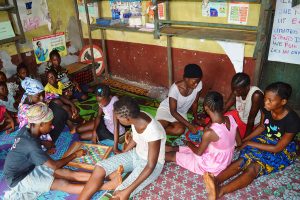The government of Sierra Leone, the U.N. Capital Development Fund, the U.N. Development Programme and technology and micro lending non-profit Kiva are partnering to build a “blockchain-based identity and credit-score system to enhance financial security in Sierra Leone.
Kiva, a non-profit micro lender, has been used by more than 1 million Americans in the U.S.
The project plans to use distributed ledger built by Kiva, the Kiva protocol, to establish a, “credit bureau of the future, and give its seven million citizens, access to financial services.” Funding for the project will come from grants and donations that will be separate from those made to its operating expenses.
Why This Matters Kiva selected Sierra Leone for first implementation of its Kiva Protocol after considering 85 countries. One reason Kiva selected Sierra Leone is that it currently only has one credit bureau that covers 2,000 people– less than 1 percent of the country’s population – and only 20 percent of the population is banked. Sierra Leone’s current systems also keep its citizens in perpetual disadvantage. “Recording financial records from the ‘informal economy,’ like a local shopkeeper’s credit, is critical because people who are unbanked aren’t currently able to leverage their history for business loans, education or even basic medical services. They are forced to operate in a cash-only economy that is risky, unpredictable and keeps families trapped in cycles of poverty.” Digital Wallets According to Kiva’s website, the nonprofit will provide a blockchain platform that includes digital wallets. These wallets will reportedly be issued to citizens without banking services and capture all “credit events,” such as when they take out or repay a loan or are extended credit from a local vendor. The person who owns the wallet will be in full control over their identification and credit history and be able to choose when, and with whom, their information is shared. Kiva says citizens can access their wallets either through an application on their smartphone or through a microfinance or government agent already working in their community. These agents will reportedly be able to access these wallets – with the owner’s permission – online or offline. The new system is intended to help the estimated 80 percent of Sierra Leone residents who are unbanked prove their identity and creditworthiness. Transparency Protocol When any lender (Kiva partner or not) makes a loan, this will send the borrower a signed verifiable claim with the details of that loan. The borrower accepts the verifiable claim and posts it to their private credit ledger in their digital Kiva wallet. The same happens with a repayment – when a borrower makes a repayment, the lender sends a verifiable claim that the borrower approves and posts to their ledger. This enables all credit events to be captured in a single ledger, with access to the digital wallet controlled by the individual. For example, if someone has verified credit history with a local lender or Kiva Field Partner and wants to apply for a loan from a national bank, they can grant that bank one-time access to their credit history. However, no institution or the government can access the information without the owner approving. Through the proposed project, Kiva also plans to help reduce fees that might prevent people or institutions from using other credit reports. People can either access their digital wallet through an application on their cell phones, or can work through a microfinance institution or government “agent” who is already working in their community. These agents will be able to use the application online or offline. Read More Kiva Partners with Sierra Leone press announcement Lubin, “The Equifax hack and the Road to Decentralization“, LinkedIn, 2017. https://www.linkedin.com/pulse/another-way-equifax-hack-road-decentralization-joseph-lubin/








